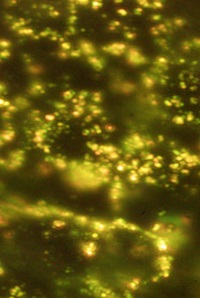Gold moulded to kill cancer
 Australian researchers have engineered gold-based molecules that target cancer cells and leave healthy cells unharmed.
Australian researchers have engineered gold-based molecules that target cancer cells and leave healthy cells unharmed.
The development could be a critical step towards precision cancer drugs with fewer toxic side effects.
Pre-clinical studies have shown the molecules were up to 24 times more effective at killing cancer cells than the widely used anti-cancer drug cisplatin and were also better at inhibiting tumour growth.
The molecules were also more targeted and selective, making them promising candidates for development into a new class of gold-based drugs that can wipe out the cancer without destroying healthy cells.
Significantly, the synthetic molecules are built with resistance-fighting features to keep them effective over time, unlike current chemotherapies.
Dr Neda Mirzadeh says current limitations in commonly used metal-based chemotherapies are driving a search for better alternatives.
“We’ve made huge inroads in cancer treatment over recent decades, but the disease still kills over 9.6 million people globally each year and remains the world’s second leading cause of death,” Mirzadeh said.
“While metal-based drugs have successfully pushed survival rates up, their effectiveness is limited because of toxic side effects, drug resistance and poor stability.
“The gold-based molecules we’ve designed are far more selective and stable.
“Our results show there’s incredible potential here for the development of new cancer-fighting therapeutics that can deliver lasting power and precision.”
The molecules were evaluated in pre-clinical tests and found to be highly cytotoxic against prostate, breast, cervical, melanoma and colon cancer cells. Animal trials showed treatment with the molecules significantly inhibited tumour growth (up to 46.9 per cent, compared with 29 per cent for cisplatin).
The gold-based compounds also inhibit the action of an enzyme found in cancer cells, thioredoxin reductase, that is linked with cancer progression and the development of drug resistance.
In addition, the molecules have strong anti-inflammatory properties, giving them a dual therapeutic effect and potential application in the treatment of chronic inflammatory conditions like arthritis.








 Print
Print